Today, I am wrapping up the chapter on the FLD and society. I am always amazed how one might think he knows a subject, but when he starts to write, he realizes how many more connections there are than he had originally identified. At least, this is what typically occurs in my writing. The Six Duties of Society are what’s good in human nature, working together in cooperation to produce results which leads to prosperity and justice within society. In contrast, the Five Laws of Decline are what’s wrong with human nature, working selfishly to exploit others production which leads to poverty and injustice within society. Soberingly, both of these natures are inside of all of us. Indeed, it’s only when society learns to systematically magnify the good, while checking the bad, that it becomes possible for the quest for concord and justice for all to be achieved. LIFE Leadership intends to play its part in helping society fulfill the quest.
Sincerely,
Dwelling inside of every human being is the ability to do remarkable acts of good and evil. In fact, its the good actions of cooperating human beings within society that satisfy the SDS. However, as mentioned in the previous chapter, mankind also has a darker side. In essence, the Five Laws of Decline (FLD) capture this darker side by systematically describing man’s inhumanity to man. For in his core, man is tempted to reap where he hasn’t sown, seeking to exploit from other’s production rather than producing himself. Accordingly, when the SDS is fulfilled and society prospers, the exploiters have greater opportunities to siphon the wealth of others into their unearned pockets. The FLD, in other words, is the author’s systematic method for describing how man’s inhumanity to man destroys cooperation within organizations and societies. This concept was first introduced in my book RESOLVED: 13 Resolutions for LIFE and then expanded upon in the book LeaderShift, co-authored with Oliver DeMille. Basically, when the FLD are not checked, society is split into two groups – those who produce wealth and those who plunder it. James Madison described man’s nature accurately when he wrote, “If men were angels, no government would be necessary.” Men, however, are not angels; therefore, if tempted by large enough rewards and low enough risk, the historical record displays mankind will exploit his fellow man. Governments, in sum, were created by society to restrain man’s desire to exploit others through decreasing the potential rewards available greatly increasing the risk of punishment if exploitation is attempted.
 For just as a pickpocket typically avoids practicing his craft in the vicinity of police officers, so too do exploiters usually avoid practicing plunder where government is performing its proper role. However, it’s crucially important to remember that government itself is an organization consisting of men and women who also have sinful natures; thus, if society isn’t diligent, the government’s “monopoly of force” can be redirected from its proper role of protector into an unjust role of exploiter. In fact, much of third-world poverty is a disgraceful result of government force being used as a tool of injustice rather than justice. Although Western Society governments are, of course, less overt than their third-world counterparts, but the same principle still holds true – that all governments must be diligently watched to ensure that exploiters do not gain control of government and set up systems of exploitation, using the “monopoly of force” for unjust ends. Indeed, the real challenge to taming the FLD within society is that any government with sufficient power to protect, is, by definition, also given enough power to exploit. The paradox of government’s “monopoly of force” is clearly revealed in the need for delegated force within society but also ensuring this force is used to restrain the FLD not encourage them.
For just as a pickpocket typically avoids practicing his craft in the vicinity of police officers, so too do exploiters usually avoid practicing plunder where government is performing its proper role. However, it’s crucially important to remember that government itself is an organization consisting of men and women who also have sinful natures; thus, if society isn’t diligent, the government’s “monopoly of force” can be redirected from its proper role of protector into an unjust role of exploiter. In fact, much of third-world poverty is a disgraceful result of government force being used as a tool of injustice rather than justice. Although Western Society governments are, of course, less overt than their third-world counterparts, but the same principle still holds true – that all governments must be diligently watched to ensure that exploiters do not gain control of government and set up systems of exploitation, using the “monopoly of force” for unjust ends. Indeed, the real challenge to taming the FLD within society is that any government with sufficient power to protect, is, by definition, also given enough power to exploit. The paradox of government’s “monopoly of force” is clearly revealed in the need for delegated force within society but also ensuring this force is used to restrain the FLD not encourage them.
For exactly how does a society delegate to government a “monopoly of power” to restrain exploitation, but then ensure no group of exploiters gain control of the government to use its “monopoly of force” for unjust ends? Indeed, if a group of exploiters did manage to legally control the government, how would society stop them from gradually passing laws to “legalize” societal plunder for the rulers benefit?Furthermore, if society’s members object to the government’s violations of inalienable rights, the exploiters, unbelievably, can now access the “monopoly of force” to intimidate the protesters into compliance of the “laws”. Shockingly, the government’s hammer, instead of pounding exploiters to ensure justice for all, is now in the exploiters’ hands to pound society, ensuring plunder for rulers and injustice for the ruled. In truth, this isn’t just hypothetical reasoning, for this scenario has occurred numerous times in history. Probably the best known historical case, for instance, was Hitler, who, learning from his aborted Beer Hall Putsch, followed quasi-legal methods to seize control of government when he was elected democratically elected and then appointed Chancellor by President Von Hindenburg.











